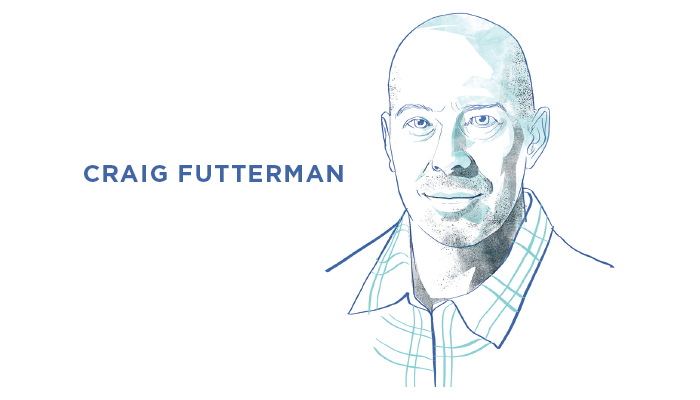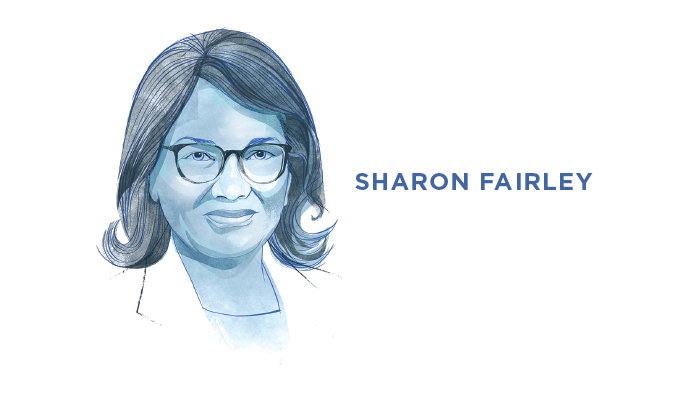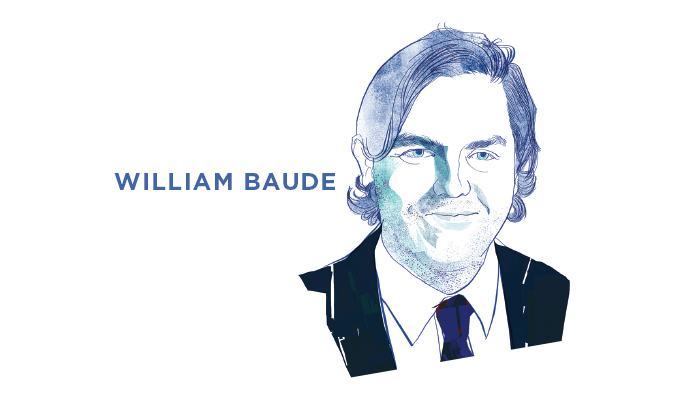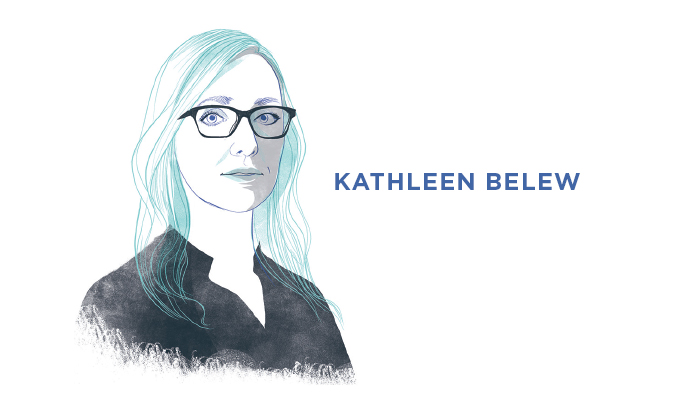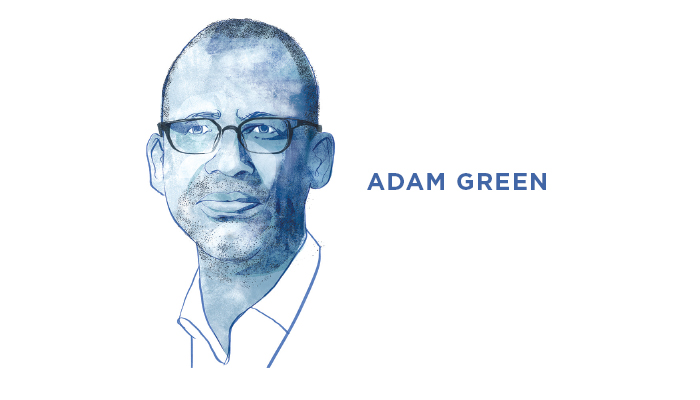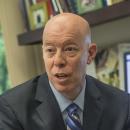Racism, Policing, and Protest
The killing of George Floyd at the hands of Minneapolis police in May sparked protests across the United States and moved racial disparities in policing to the center of the national conversation.
In June and July we spoke with five UChicago faculty members who have long been part of the intersecting dialogues on police reform and racism in the United States. Three address why we’ve remained entrenched in a cycle of misconduct and outrage—and whether the protests of 2020 offer a pathway out. Two discuss the protests in broader historical contexts, specifically the civil rights movement and White supremacy. Their comments have been edited and condensed.
Craig Futterman, a clinical professor at the University of Chicago Law School, founded and leads the Civil Rights and Police Accountability Project of the Mandel Legal Aid Clinic. He was instrumental in the release of video footage from the fatal 2014 Chicago police shooting of 17-year-old Laquan McDonald, and continues to advocate for greater police accountability. In June he won a case, with the City of Chicago, against the Chicago Lodge of the Fraternal Order of Police preventing the destruction of years of records related to police misconduct.—S. A.
I want to start by addressing one of the central premises of the current dialogue: Does policing actually keep us safe?
An important place to start is, who is that “us”? For Black, Brown, and poor communities—the answer for all too many people has been no. Indeed, the police presence actually instills terror in many young Black and Brown folks.
The question itself, however, is unfair to the police, because it rests on a widely shared myth that police are the end-all and be-all solution to problems of public safety. We have wrongly demanded police do things that they are ill-suited to do.
Police may be well suited to responding to an incident of serious violence or investigating a serious crime, but the vast majority of things that we ask police to do involve resolving interpersonal conflict, addressing public health issues such as drug and alcohol addiction, and intervening in mental health crises.
When you’re a hammer, everything looks like a nail. And the police hammers of arrest and force are not the right tools to treat poverty, unemployment, homelessness, conflict among neighbors, drug addiction, and mental illness.
What do you see as the major barriers to police reform?
The lack of accountability is a primary impediment to real change. Without accountability, officers know they can abuse people and not lose their jobs or be prosecuted. A culture and reality of accountability can make a dramatic difference.
Policing in America and beyond has been incredibly resistant to public scrutiny. There’s an entrenched culture and mindset that protects its own—“nobody understands us but us.” This can breed an “us against them” mentality and makes departments closed to the very communities they are sworn to serve.
While there are examples around the United States of so-called independent agencies to investigate police misconduct, the reality is that they’re not so independent and they are not sufficiently empowered and resourced to perform high-quality investigations.
We know that police abuse is a highly patterned phenomenon, and yet many police contracts prohibit police departments from looking at patterns of complaints against officers.
My clinic at UChicago just won a case before the Illinois Supreme Court. The police union was seeking to destroy, pursuant to their contract, hundreds of thousands of records of police misconduct—to destroy the ability to identify and root out officers engaged in patterns of abuse, to prevent people in the community from ensuring that our government is working in the public interest.
Some activists are calling for drastic changes to policing, including the abolition of police departments. What do you think?
We need to fundamentally rethink the way we do policing in America and how we think of public safety.
There are also many concrete things that we can do—the low-hanging fruit that has long existed, but that we as a nation have lacked the political will to implement. There are commonsense reforms to addressing accountability, transparency, the code of silence, and the racism that exists in police departments.
And while holding officers accountable, being honest, and eliminating unnecessary negative encounters don’t sound particularly sexy, they would be transformational in and of themselves. There have been innumerable scandals and gestures toward reform in the midst of political crises. But when the crisis subsides, our heads turn elsewhere, leaving us perhaps with something like more body cameras, while the underlying condition of police impunity in Black communities remains unaddressed.
Some activists are arguing that we’ve tried reforms, and they haven’t worked. But it sounds like you’re saying we haven’t really tried them. Is that fair?
That’s exactly fair. Pretty much everything that I’ve said hasn’t been tried: I can count on one hand civilian oversight agencies that are truly independent from their municipalities and that have the power and resources to actually do high-quality investigations.
There’s not a police department in the nation that has committed to using pattern evidence of misconduct. Every police chief in urban America will say, “5 percent of my force is responsible for more than half of my problems,” but they won’t use that information and do what police departments are actually pretty good at doing, which is investigations.
I also don’t want to play small ball and just say reform. Even if we had a police department with perfect accountability, we still need to fundamentally rethink how we are addressing violence in America. What I said at the outset of the conversation still remains true, and that is, looking to police to solve social problems that they don’t have the answers to solve just re-creates the systemic problems that we continue to have.
Does it surprise you how dramatically the conversation around policing has shifted in such a short time?
Generations of Black and Brown folks have known about these issues because they’ve been living with the reality of systemic police abuse and systemic racism since before I was born. What’s new is a much more widespread awakening in White America.
I’ve seen in my lifetime dramatic progress when it comes to racial justice, but with each step forward, we’ve also seen a powerful backlash.
As we have this conversation today, I see so much hope and beauty and possibility. At the same time, though, I don’t want to be delusional. This present moment doesn’t have to have a happy ending. If we’ve learned anything, it’s that the only way positive, sustained change occurs is if we make it occur.
Sharon Fairley, JD’06, is a professor from practice at the University of Chicago Law School who spent eight years as a federal prosecutor in the US Attorney’s Office for the Northern District of Illinois. In December 2015 Fairley was appointed chief administrator of Chicago’s Independent Police Review Authority, the agency responsible for police misconduct investigations. The agency later became the Civilian Office of Police Accountability (COPA). Since stepping down from that role in 2017, Fairley has advocated for changes that would strengthen COPA’s oversight powers.—L. D.
You published a paper early this year that said we were in a watershed era for civilian oversight of police. What do you think now? Are you hopeful?
I think this moment has prompted serious and honest conversations of a kind that were just not happening before: about policing, policing strategy, policing’s impact on certain communities. There seems to be more openness to consider the kind of fundamental reform that was just dismissed before, that wasn’t thought of as being possible. So I am hopeful.
How does civilian oversight fit into broader police reform and accountability efforts, and how effective has it been?
The concept of civilian oversight has been around for a long time. If you look at Chicago, in the early 20th century there were civilian inspectors who were responsible for investigating complaints of misconduct by the police department. But the concept has evolved over the decades. The first real civilian oversight entity cropped up in Washington, DC, in 1948. Then it became a national movement that took hold in the 1970s and ’80s and flourished from there into different types of oversight. There are entities that just provide a review function, entities that investigate. Over time greater sophistication is being built into these systems.
Still, when you look at Minneapolis, they had a civilian oversight entity operating there. So the question is, why doesn’t civilian oversight do a better job of preventing police brutality and police misconduct?
Usually a city will start with one form of oversight and find out that just isn’t enough. One thing that came out in my research was that the most prevalent form of civilian oversight is the review board. That’s where a group of individual civilians review the internal investigations that are conducted by the department itself. That is often the most benign form of civilian oversight; they don’t usually have a lot of power. They can make recommendations, but they can’t push through reform from a policy perspective or make specific disciplinary recommendations that a department is required to observe.
Some of the more forward-thinking jurisdictions are creating multitiered systems that allow their review entities to conduct their own investigations, audit police investigations, and make specific disciplinary recommendations. They’re creating a more robust set of checks and balances to work in an integrated way.
Your paper identifies a cycle that limits police reform efforts: scandal, reform, repeat. What would you look for as signs that the cycle is finally breaking?
It all boils down to one thing: trust. To break the cycle, there has to be a system in place that the community believes in—that it trusts is providing effective oversight, making good decisions, and being transparent. That’s really the crux of the issue. So when a scandal occurs, the community says, we trust them to do a good job. They’ll do a good investigation. They’ll make the right decision. They’ll hold the officer accountable. As long as the community lacks trust that the officer will be held accountable, we’re going to see the same cycle over and over again.
What are the biggest obstacles, and how do you keep the faith?
Police reform is really hard. It takes a lot of courage and wherewithal on the part of city leaders—and it takes resources. When you think about the challenges that somebody like Chicago’s mayor faces, they have to balance pushing through reforms while maintaining the support of the officers who are required to do the work. This is often a very, very difficult balance to reach. But these are challenges we have to take on.
Civilian oversight is always going to draw resistance from the police unions. That’s going to be an ever-present barrier. There’s always going to be pushback against reform, so we have to have the mettle to stand up and persist. Good things really can happen. Washington State recently changed their use-of-force law. That legislation arose from a robust activist effort. An activist community formed and did the hard work to get an initiative on the ballot. They lobbied for it, it won the support of voters, and the legislature codified the change into law. Things can happen when we have the right energy and focus on the right issues. That’s why I have some optimism.
Your paper looks at a particular kind of local effort. How much do federal and state legislation stand to help?
There’s opportunity for reform at all levels of government. Federal legislation can be very helpful by creating a national consensus on some of the bigger topics. One of the most important is qualified immunity and the barrier it creates.
At the state level, there are two areas of reform that I think are important. The first is the state laws that govern the use of force. Most of them are terrible. California changed theirs last year and made some significant headway. Washington State, as I mentioned, improved theirs. But Illinois’s are god-awful.
Second is the law enforcement officer bill of rights legislation that many states have, which provides due process for law enforcement officers. They started in the ’70s to ensure officers weren’t being fired or disciplined for political reasons. But they evolved in a way that has served as an impediment to accountability.
How do you think about the role of racism in policing?
Historically we know the concept of municipal policing, at least in the South, arose out of the slave posses, so we start there. You also have to look at the evolution of policing over the past few decades—the concept of police as warriors, which creates an us versus them mentality. It creates a culture that dovetails with systemic racism and amplifies it.
Decades ago, the beat cop walked around the neighborhood and knew everybody. Then officers were put into cars and there was less of a connection. There was the militarization of police officers and equipment beginning in the late 1960s. The broken windows theory in the 1970s contended that stopping people for small infractions would reduce more serious crimes. That unfortunately took root throughout policing across the nation, starting in New York and Los Angeles, and was the precursor to stop and frisk, which started us down the path of overpolicing some communities. It’s all of these factors coming together: systemic racism, general trends in policing, the way that policing started, culture within organizations, all of it. Like the perfect storm.
What is your view of calls to defund the police?
The “defund” word is a little polarizing. I don’t love the word, but it’s a really important concept. Which is, let’s take the limited resources we have in our community and make sure we are expending them in the most effective way to address the public safety challenges that we face. UChicago’s own Crime Lab has done a lot of work showing that sometimes dollars are better spent on social programs, after-school programs, job programs, mental health support, and other social services.
We need more evidence-based approaches to how we expend our resources to best address public safety. There’s some experimentation going on—communities that are trying to create a group of responders who can respond to people with mental health crises so you don’t have to have an officer showing up with a gun to do that.
How do you determine how many police officers you need? It’s a difficult question, and there is no established scientific way to answer it. Over the years, politicians go to the easy solution when there’s a crime problem, which is to add more police. Then they can point to something they’ve done. Now we have to ask, does this make sense? Are there tasks we’re asking police officers to do that could be effectively done by another resource? Those are valid questions.
William Baude, SB’04, is a professor and Aaron Director Research Scholar at the University of Chicago Law School, where he teaches about federal courts, constitutional law, and conflicts of law. In 2018 he wrote what he expected would be a little-noticed paper on qualified immunity, the doctrine that grants government officials, including police officers, broad immunity from civil suits. Instead the paper sparked new dialogue on the 40-year-old doctrine; in recent months, qualified immunity has become a particular focus of police reform efforts. On June 4 Rep. Justin Amash (L-MI) introduced to Congress a bill to end qualified immunity; as of this writing, its fate is uncertain.—S. A.
How long has the doctrine of qualified immunity been around?
After the Civil War in 1871, Congress enacted a statute that lets you sue state officials who violate the law. That remained on the books until 1967, when the Supreme Court first planted the seeds of what’s now the qualified immunity doctrine in a case called Pierson v. Ray. Chief Justice Earl Warren said that when you sue a government official for doing something unconstitutional, you can’t get damages against them if they arrested someone in good faith.
Over the next 15 years, the court expanded the doctrine in various ways. Then in 1982, in a case called Harlow v. Fitzgerald, the court codified this as the modern qualified immunity doctrine and said you have to show that an officer has violated clearly established law.
How has the court interpreted what “clearly established” means?
There are many cases and many formulations. One that I think puts it quite well is that an officer only violates clearly established law if they are either plainly incompetent or knowingly violate the law. That’s the test.
There are two ways you can be found to have violated fully established law. One is to have a previous case that said, this action is unconstitutional. You can also be found to have violated clearly established law if the action is just so obviously unconstitutional, so egregious, that it’s clearly established at a more abstract level.
In practice, courts usually insist on the first, not the second. This comes up a lot in the policing context, and especially the use of excessive force against civilians.
What are the arguments in favor of qualified immunity?
I think there are three major categories. One is, it’s been here for a long time, so if it isn’t broke, don’t fix it. Changing the system would impose real costs.
A second thing advocates would say is that government officials generally, and police particularly, are frequently forced into situations where they have to make split-second decisions, so it’s not fair to flyspeck every choice they make. We put a lot of society’s problems on the police and expect them to solve it when they don’t have the training and resources to be able to do that. They would argue qualified immunity is a recognition of that problem.
A lot of that’s true. But I’m not sure we’re doing the police any favors by saying it doesn’t really matter whether they violate the law. Maybe we should rethink the legal rules and maybe we should provide training and resources to make sure that people comply with the law.
The third argument often made in defense of qualified immunity is that it’s actually important for helping courts recognize new rights. Every time the court recognizes a new right, one thing they have to think about is, well, what happens to everybody who wasn’t acting in accordance with that before? That might make it harder for the Supreme Court to ever recognize new rights.
I think it’s not a coincidence that the seeds of the doctrine were first planted by Chief Justice Warren, who recognized a lot of new rights, and probably was aware that being able to do that—being able to say, for example, the police have to read you Miranda warnings—would be a lot easier if you could promise people that they wouldn’t be held liable if they’d acted in good faith.
I’d argue that at this point we’re not recognizing a lot of new rights, so I’m not sure qualified immunity applies to them very often.
Why do you think qualified immunity needs to be reformed?
There’s a legal point and then a practical point. The legal point is that Congress is the one that decided to create remedies for the violations of people’s civil rights. They didn’t decide to put qualified immunity in there. It’s not the court’s job to take statutes and amend them by adding things they think would be a good idea.
The practical problem is that it removes one of our main systems of accountability. It means that nobody’s responsible for worrying about whether police officers are compliant with the law.
In a world without qualified immunity, what happens to individual government officials probably wouldn’t change very much. Usually police officers and other government officials are indemnified either by insurance companies or their employers. They don’t typically pay judgments against them personally and that probably wouldn’t change. But it would mean that the police department, the city, and the taxpayers would actually recognize all the costs that come from unconstitutional conduct, and then might have more of an incentive to think, why are we doing this and is there some way we can fix it?
And finally, there’s an argument, somewhere in between practical and theoretical, that qualified immunity is ultimately a double standard. If you or I violate the law, there’s a rule that ignorance of the law is no excuse. We can’t go into court and say, gee, the law is really complicated and I just didn’t realize this was inappropriate, or I was acting in good faith, so I shouldn’t get in trouble. You or I can get into a lot of trouble even when we’re acting in good faith.
But police officers and other government officials are held to a lower standard. If anything, you might think they’d be held to a higher standard since they’re trained to know what the law is. If anybody is supposed to know the law, you’d think it would be the people who are enforcing it with guns.
How important of a barrier to police reform is this in the grand scheme of things?
It’s hard to say. The problems are systemic, so the solutions have to be systemic—and qualified immunity’s effects are systemic, so it’s an important piece of the puzzle. But I can’t imagine that it alone would be enough.
Another important institutional problem is police unions, which make it very, very hard to take measures to discipline or remove officers who do something wrong. You can imagine those two reforms working in concert. Without qualified immunity, a government would have more incentive to do something about its bad officers. But without, say, union reform, it might not have the ability to do something about it.
Why was qualified immunity seized on as an instrument of reform?
I have no idea why, but I do think it has two features that make it seem wrong as a matter of common sense. One is, we’re told the Constitution is the highest law and that everybody has to obey the Constitution. With qualified immunity, the steps are, did you violate the Constitution and then do we care? There’s something weird about having a step that asks, do we care about violating the Constitution? You’d think, of course we care about the Constitution.
The second thing that makes it stick out is the double standard, the sense that the police are literally above the law and formally given a privilege to ignore the law that ordinary people don’t have.
Is there anything about qualified immunity worth saving?
When the court recognizes a new right, some sort of good faith doctrine would make sense. Only a few years ago, the Supreme Court recognized the right to same-sex marriage. I don’t think it would make a lot of sense if people could sue county officials who the day before the ruling were following Supreme Court precedent. Recognizing that kind of true good faith situation would make a lot of sense. But expanding it to a general warrant to ignore the law is the bigger problem.
Kathleen Belew is an assistant professor of history. Her first book, Bring the War Home: The White Power Movement and Paramilitary America (Harvard University Press, 2018), explored the origins of the White power movement.—S. A.
How did White supremacy come to be, in many ways, the organizing principle of American society?
Who is White, and what Whiteness is, are socially constructed and historically mutable. Whiteness, as most of us have probably come to understand it and internalize it, is really a 20th-century product. That’s where we see the coming together of a whole bunch of ethnic groups in the United States, like the Irish, the Italian, and many others, who were not thought of as White in their earlier history, into the more rigid category that we have now.
White supremacy is bigger than this category of Whiteness, and it’s much bigger than individual belief or individual interpretation. I think of it as all of the systems, histories, beliefs, and mechanisms that create unequal outcomes based on race.
You study the organized White power movement. When and how did it emerge in its modern form?
The White power movement is a coordinated social movement beginning in the late 1970s and stretching into the present that brought together Klansmen, neo-Nazis, tax defectors, violent White separatists, followers of White theologies, and then later on skinheads and militiamen in an overtly antigovernment social movement.
Its largest act of violence, so far, was the Oklahoma City bombing in 1995, which was the most deadly mass casualty event on American soil between Pearl Harbor and 9/11. The bombing is still something that I think most people don’t really understand as the work of an organized social movement, but the White power movement is an organized social movement, with everything from hit lists and ideological screeds to shared childcare and homeschool curriculum.
It is a wide-ranging group of people that in all ways, other than race, is quite diverse, from all regions of the country, all ages, and with all kinds of different educational backgrounds.
Why have we failed to recognize the White power movement as a movement?
The White power movement adopted a strategy in the early 1980s called leaderless resistance that is very similar to cell-style terrorism. The idea is that one or a few activists could work together in a cell that would be coordinated with other cells in common cause, but without communication directly between cells or with movement leadership.
They adopted that strategy largely because of frustrations with federal infiltration in the civil rights era. The much larger and more cataclysmic aftermath effect of leaderless resistance has been that we, as a society, have lost sight of White power as a movement at all. What we get instead are a whole bunch of stories about lone wolf gunmen or a few bad apples that aren’t connected with each other, when in fact what we’re dealing with is a broad-ranging and far-reaching social movement. When we start to see it that way, we start to see a rise in activity, and I think it’s important for understanding the sense of urgency that this should demand.
We’re now seeing White power groups using social media in really savvy ways—to the point they can claim it’s just a joke or just trolling. How can we confront that?
The way I teach my students to think about this particular question is that White power has always worked in an opportunistic fashion. It has always used the prevailing local culture to grab as many people as it can.
In the 1920s, when the Klan was four million people and 10 percent of the state of Indiana, that era is characterized not only by what you would expect now, meaning White supremacism, racism, nativism, and violence, but also by 1920s cultural markers. If you look at a woman’s Klan uniform, it’s slim cut, it shows a bit of ankle, it’s very fashion forward for the time. The Klan figured out how to be cool.
Similarly, in the 1980s, you see them wearing camo-fatigue uniforms a lot. That’s partly operational. It’s also because people thought camo fatigues were cool in the ’80s. When we see tiki torches and polo shirts in Charlottesville, Virginia, when we see Hawaiian shirts now, all of that is activists figuring out how they can opportunistically use the present moment.
What is it like to teach about these issues?
For each person it’s a different set of processes. Some students come into class aware of the idea of this history already, and others don’t. I mean, I can speak for myself: in college I read George Lipsitz’s The Possessive Investment in Whiteness, and started to think about how you can have an open heart and no individual prejudice but still be benefitting from these systems. It was a crusher.
But it’s also not a matter of interpretation; it’s a matter of historical fact. And I believe that understanding the history is one of the ways that people can work for a more fair world. Facing difficult histories isn’t easy, but University of Chicago students are never afraid of a task that isn’t easy.
You previously did research on truth and reconciliation efforts. How does that affect your perspective on what we’re seeing today?
I actually came into my first book, on White power, by looking at a 2005 truth and reconciliation commission underway in Greensboro, North Carolina, around an act of violence committed in 1979 by Klan and Nazi gunmen that had never been adequately prosecuted or responded to by the community. At that time, there had been no national conversation about a lot of the racial violence in our nation’s history.
Strikingly, if you look at other countries that have had deeply entrenched systems of White supremacist government, racial violence, and racial inequality, all of them, unlike the United States, have had national comings together around what that means and what agreed-upon history we should tell about what happened.
I think that the focus on monuments and memorials today is one of the places where this conversation is unfolding, but it’s unfolding at a lot of levels, big and small.
A truth and reconciliation commission process also does important work in figuring out the common story that we tell together, as a country, about who we are and what we’re doing. We’re a country that has huge claims about life, liberty, and the pursuit of happiness, but those claims were only made, at the founding of our nation, for free property-owning white men, and the expansion of those claims to include other groups—non-property-owning people, women, people of color, Indigenous people—did not just happen out of goodwill.
Those rights were fought for. They were organized for. They were demanded. I think the American promise is an imperfect promise and fighting for the expansion of those rights to include more people is one of the things that we’re seeing on the streets.
Adam Green, AB’85, is an associate professor of history. He studies modern US history, African American history, and urban history. He is the author of Selling the Race: Culture and Community in Black Chicago, 1940–1955 (University of Chicago Press, 2007) and a coeditor of Time Longer than Rope: A Century of African American Activism, 1850–1950 (New York University Press, 2003).—S. A.
Why do we, as a nation, struggle so much to talk about our racial history?
That’s a complicated question. Part of it is, of course, that the United States was founded in a forceful and sometimes violent process of taking land that was occupied. The process of the country becoming the country was always one of erasing history.
The other primary legacy of violence was that slavery became instrumental to the growth of the country economically. Cotton and sugar were among the first major global commodities of the modern era and became the basis of America’s economic wealth.
When you think about those two processes—seized land that encompassed literally the entirety of the country, and cotton grown through slavery—then it’s hard to imagine the country reckoning with that heritage in anything other than a violent way.
The racial past of this country is no easy heritage to reckon with. It’s a heritage steeped in the domination of some people over others. It’s a heritage steeped in oppression. It’s a heritage that’s steeped in blood.
We keep coming back to the same issues, the same dynamics, and the same resentments because to face the past truthfully in this country would be incredibly painful.
Is it important to have an agreed-on public narrative about national history? And is that enough?
If you give people a radically different sense of the past, an honest sense of the past, if they grow uncomfortable—by itself that changes nothing. It doesn’t hold institutions to account and mean they immediately stop doing their work in ways that are structurally and systematically racist.
But it does set the basis for people to have to actively ask themselves, am I committed to affirming the humanity of every person in my society? Am I going to work to make sure that a police department or a university or a church or a real estate company or an employer are similarly recognizing the humanity of all people?
Have we ever made meaningful efforts to reckon with our national history?
We’ve certainly never had a process equivalent to what took place in South Africa after apartheid or what was done in Rwanda after the genocide to establish collective understandings about the atrocities that had taken place. It’s been close to 30 years since Rwanda underwent its genocide, and many people there are still dedicated to that work.
In the United States, there have been discussions, proposals, and presidential commissions, but there’s never been a commitment on the part of the government and leading institutions—including, it has to be said here, universities—to seriously try to pursue something like truth and reconciliation, or, for that matter, reparations.
The truth is uncomfortable. I think it’s very important to state it simply: We’ve lived by lies to this point, by and large. We’ve believed the lie that this is a country of democracy, this is a country of equality, rather than a country that’s never faced up to its heritage of slavery. Now we’re testing ourselves as to whether or not we have the courage to replace those lies with truth.
On both the right and the left, people are making comparisons between the civil rights movement of the 1960s and this moment. What do you think of those comparisons?
Remembering any historical event is in many ways a struggle and in some cases a fight. The fact that people are invoking Martin Luther King—one must remember that by 1965, the majority of White Americans disapproved of Martin Luther King. Once he began to ally himself with more challenging causes like protesting the Vietnam War or understanding the linkages between racism and poverty in the United States, even more people moved away from him.
One of the things that’s been stressed by opponents of the protests—most of them on the right but not all—has been this idea that these protests are unruly, they’re disorderly, they’re destructive, they are too angry in the ways in which they’re confronting the police.
That probably recommends going back and thinking about moments of anger that were instrumental in the civil rights movement itself: the indignation that someone like Rosa Parks felt; the anger in Mississippi at the lynching of Emmett Till and the killing of civil rights leaders over the course of 1955 while organizing to secure the vote; the anger expressed in 1963 after the bombing of the Birmingham, Alabama, 16th Street Baptist Church. Anger has always been a very, very important part of what spurs protest.
Something that has to be marked about the current protests is the numbers. We’ve seen tens of thousands of people marching simultaneously in cities across the country. Even at the height of the civil rights movement, I’m not sure you had this intensity of mobilization. Some of this has to do with social media being able to move people, some of this has to do with young people who are profoundly politicized, some of it has to do with COVID-19. Whatever it is, what is happening is its own unique moment in our national history. I think this is one of the most profound moments of political mobilization that we’ve ever seen.
How does this moment strike you as a historian?
One way to think about it is this: the March on Washington and the work of eventually passing the Civil Rights Act began in 1963. That year was the 100th anniversary of the Emancipation Proclamation, and people were imagining the Civil Rights Act was this new opportunity to fulfill the promise of the country. There was a sense that a new generation was picking up the struggle and would complete it. Fifty years later, we see how incomplete that process was.
This current moment is a tremendous opportunity, and these opportunities do not come often in life. In my lifetime I don’t think that there’s been a better opportunity to press these issues. But I also have no illusions about the depth of the fight.
I’m moved by it; I’m inspired by it; and, I have to say, I feel tasked by it as a historian. The thing to do is not to look around and say, wow, everybody’s mind is changed and now we’re going to have a new society. We’re in the middle of a battle, and I feel like what we’re faced with is the responsibility to do our best.
—This story was first published by the University of Chicago Magazine.
